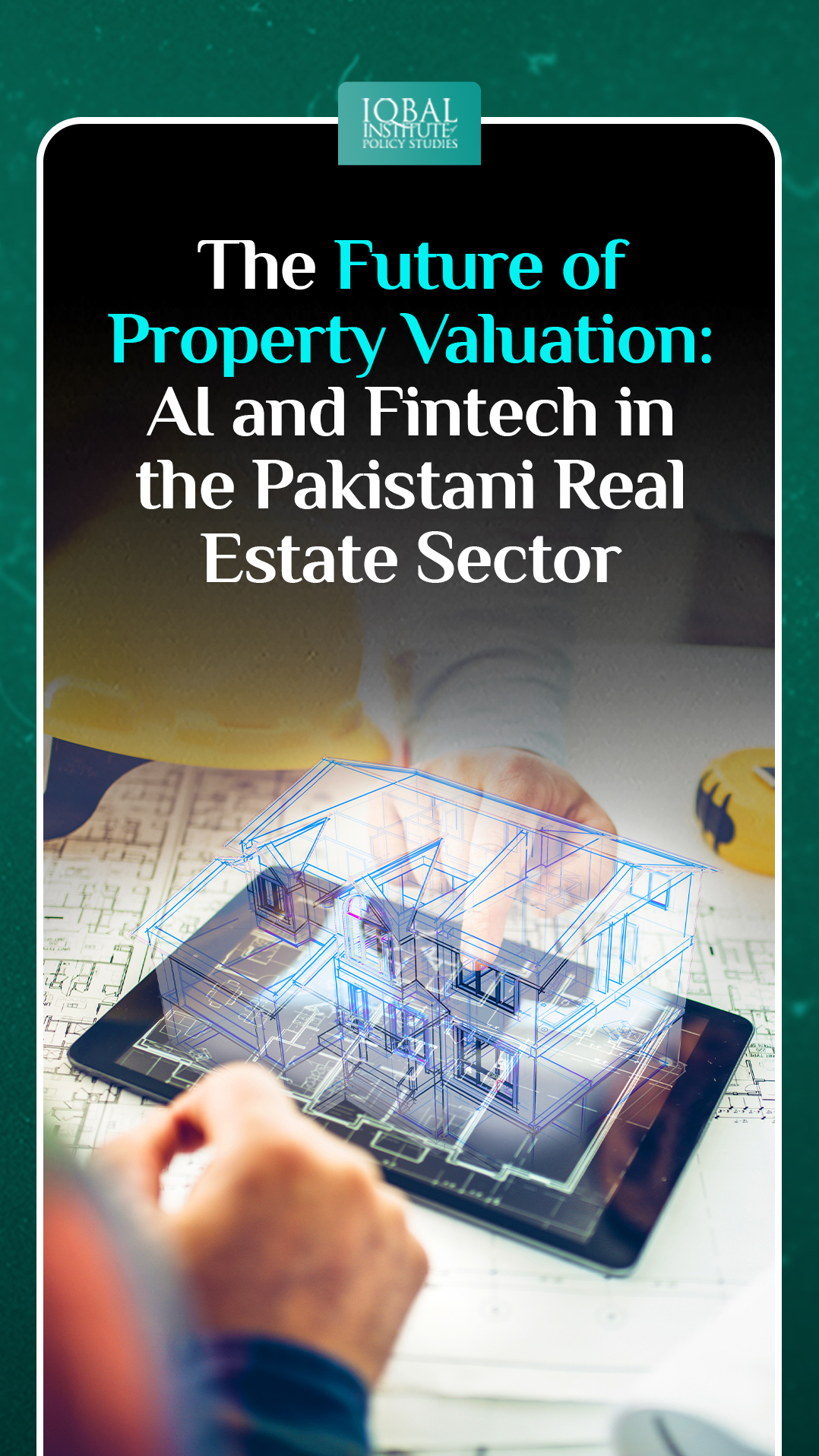The real estate sector in Pakistan has been experiencing significant growth and transformation, reflecting the country’s rapid urbanization and economic development. As Pakistan’s population continues to expand and urbanize, the demand for properties, both residential and commercial, has been on the rise. Within this dynamic landscape, the traditional methods of property valuation are undergoing a remarkable evolution. Artificial Intelligence (AI) and Financial Technology (Fintech) are emerging as transformative tools that are reshaping how properties are valued, bought, and sold. In this extensive exploration, we will delve deeply into the future of property valuation in Pakistan, driven by the integration of AI and Fintech. We will examine the benefits, challenges, and far-reaching implications of these technological advancements.
The Evolution of Property Valuation in Pakistan
Traditionally, property valuation in Pakistan relied heavily on manual processes, market trends, and the expertise of real estate professionals, such as appraisers and real estate agents. While these methods have served their purpose, they had their limitations, including subjectivity, lack of data transparency, and the potential for human error. As the real estate market becomes more competitive and data-driven, there is an increasing need for more accurate, efficient, and transparent valuation methods.
The Role of AI in Property Valuation
Data Analysis
AI algorithms have the capacity to analyze vast amounts of data, including property characteristics, historical sales, market trends, and even social factors, to provide more accurate and data-driven property valuations. This data-driven approach helps eliminate human bias and provides a more comprehensive view of a property’s worth.
Machine Learning Models
AI-powered machine learning models can identify patterns and relationships within the data that humans may overlook. This can result in more precise property valuations.
Predictive Analytics
AI can leverage predictive analytics to forecast future property values based on historical data and market trends. This is particularly valuable for real estate investors and developers seeking to make informed decisions about property investments.
Virtual Property Tours
AI-powered virtual tours and 3D modeling allow potential buyers and appraisers to explore properties remotely. This not only saves time but also enhances the decision-making process by providing a realistic view of the property.
Augmented Reality (AR)
AR applications can overlay property information, such as historical data and potential renovation options, onto real-time views during property tours, further assisting in valuation and decision-making.
Risk Assessment
AI can help assess the risk associated with a property investment by analyzing factors such as location, market stability, economic indicators, and even climate-related risks. This aids in making informed investment decisions and minimizing potential losses.
The Role of Fintech in Property Valuation
Digital Transactions
Fintech platforms facilitate digital payments, making property transactions more efficient and secure. This reduces the reliance on physical cash transactions and mitigates the risk of fraud. Digital transactions also enable real-time tracking of payments and streamline the closing process.
Escrow Services
Fintech platforms often incorporate escrow services, ensuring that funds are securely held until all contractual conditions are met, providing peace of mind to both buyers and sellers.
Real-Time Financing
Fintech companies offer real-time financing options, allowing potential buyers to assess their eligibility for loans and mortgages instantly. This streamlines the buying process and enhances transparency. Moreover, Fintech enables the comparison of loan offers from multiple lenders, ensuring borrowers secure the best rates.
Peer-to-Peer Lending
Some Fintech platforms introduce peer-to-peer lending models, connecting lenders and borrowers directly, which can provide competitive loan terms.
Crowdfunding and Fractional Ownership
Fintech has introduced innovative financing models, such as property crowdfunding and fractional ownership, making real estate investments more accessible to a broader range of investors. Crowdfunding platforms allow individuals to invest smaller sums in real estate projects, while fractional ownership platforms enable multiple investors to collectively own and benefit from income generated by a property.
Real Estate Investment Trusts (REITs)
Fintech platforms have facilitated the creation and management of Real Estate Investment Trusts (REITs), which enable investors to invest in a diversified portfolio of real estate assets.
Blockchain for Title Verification
Blockchain technology, often used in Fintech applications, can provide a secure and immutable ledger for property titles and ownership records. This reduces the risk of fraud and disputes while ensuring transparency and traceability of property ownership.
Benefits and Challenges
Benefits of AI and Fintech in Property Valuation:
Increased Accuracy
AI-driven valuation models provide more accurate property assessments, reducing the risk of overvaluation or undervaluation. By incorporating vast datasets and machine learning algorithms, AI can offer precise valuations that consider a multitude of factors.
Efficiency
These technologies streamline the property buying and selling process, reducing paperwork and transaction times. Faster transactions can benefit both buyers and sellers, leading to a more efficient real estate market.
Transparency
Fintech platforms offer transparency in financial transactions, reducing the potential for fraud and disputes. Additionally, blockchain technology ensures the integrity of property records, enhancing trust in the real estate sector.
Accessibility
Fintech solutions make property investments more accessible to a wider range of investors through innovative financing models. This democratization of real estate investment can create opportunities for small-scale investors to enter the market.
Challenges of AI and Fintech in Property Valuation:
Data Privacy and Security
Handling sensitive real estate data requires robust security measures to protect against data breaches. As AI and Fintech platforms collect and analyze extensive data, ensuring the privacy and security of this information becomes paramount.
Regulatory Compliance
Complying with data privacy regulations, such as Pakistan’s Data Protection Act, is crucial for AI and Fintech companies operating in the real estate sector.
Regulatory Framework
Implementing AI and Fintech solutions in the real estate sector requires appropriate regulatory frameworks to ensure ethical and fair practices. Regulations should address issues such as data handling, transparency, and consumer protection.
Skill Gap
AI and Fintech adoption may require upskilling or reskilling of real estate professionals to effectively leverage these technologies. Ensuring that industry practitioners are well-equipped to use AI tools and understand blockchain applications is essential for successful implementation.
Market Acceptance
There may be resistance to adopting AI and Fintech in a traditionally conservative industry like real estate. Building trust and acceptance among industry stakeholders and consumers is a crucial step in the adoption process.
The Implications for the Future
The integration of AI and Fintech into property valuation has the potential to revolutionize the Pakistani real estate sector. These technologies will result in more accurate valuations, faster transactions, increased transparency, and greater accessibility to property investments. However, realizing these benefits requires a concerted effort from all stakeholders to address regulatory, security, and skill-related challenges.
Conclusion
As Pakistan continues to urbanize and its real estate market evolves, AI and Fintech will play a pivotal role in shaping the landscape of property valuation and transactions. By leveraging these technologies responsibly and collaboratively, the Pakistani real estate sector can embrace a future of innovation, efficiency, and accessibility, ensuring sustainable growth and development.
This article is written by Radma Nouman. Radma is a research analyst at the Iqbal Institute of Policy Studies (IIPS).



Leave a Reply